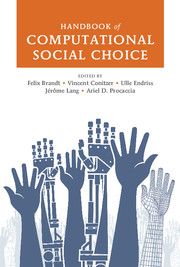14 - Matching under Preferences
from Part III - Coalition Formation
Published online by Cambridge University Press: 05 May 2016
Summary
Introduction and Discussion of Applications
Matching theory studies how agents and/or objects from different sets can be matched with each other while taking agents’ preferences into account. The theory originated in 1962 with a celebrated paper by David Gale and Lloyd Shapley (1962), in which they proposed the Stable Marriage Algorithm as a solution to the problem of two-sided matching. Since then, this theory has been successfully applied to many real-world problems such as matching students to universities, doctors to hospitals, kidney transplant patients to donors, and tenants to houses. This chapter will focus on algorithmic as well as strategic issues of matching theory.
Many large-scale centralized allocation processes can be modelled by matching problems where agents have preferences over one another. For example, in China, over 10 million students apply for admission to higher education annually through a centralized process. The inputs to the matching scheme include the students’ preferences over universities, and vice versa, and the capacities of each university. The task is to construct a matching that is in some sense optimal with respect to these inputs.
Economists have long understood the problems with decentralized matching markets, which can suffer from such undesirable properties as unravelling, congestion and exploding offers (see Roth and Xing, 1994, for details). For centralized markets, constructing allocations by hand for large problem instances is clearly infeasible. Thus centralized mechanisms are required for automating the allocation process.
Given the large number of agents typically involved, the computational efficiency of a mechanism's underlying algorithm is of paramount importance. Thus we seek polynomial-time algorithms for the underlying matching problems. Equally important are considerations of strategy: an agent (or a coalition of agents) may manipulate their input to the matching scheme (e.g., by misrepresenting their true preferences or underreporting their capacity) in order to try to improve their outcome. A desirable property of a mechanism is strategyproofness, which ensures that it is in the best interests of an agent to behave truthfully.
- Type
- Chapter
- Information
- Handbook of Computational Social Choice , pp. 333 - 355Publisher: Cambridge University PressPrint publication year: 2016
- 5
- Cited by



